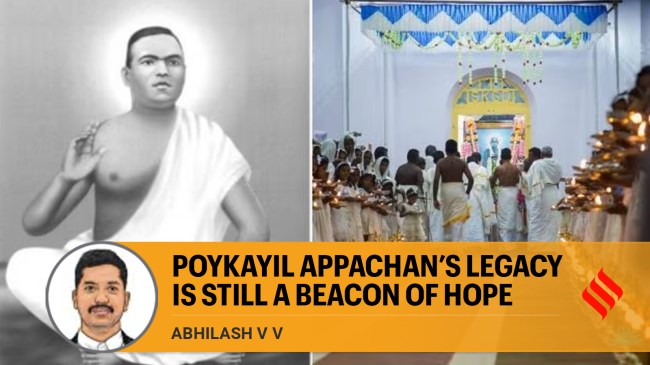Opinion Legacy of Poykayil Appachan is still a beacon of hope
Appachan was an accomplished singer, poet and elocutionist, who used well-composed songs and speeches to mobilise people for society’s liberation.
 Poykayil Appachan (prdscollege.com) and prayers at the PRDS Church (Facebook/PRDS Sanathanam)
Poykayil Appachan (prdscollege.com) and prayers at the PRDS Church (Facebook/PRDS Sanathanam) Thousands of jubilant people in Kerala celebrated the 146th birth anniversary of their spiritual guru, Poykayil Appachan on February 17. Appachan (1879-1939), also known as Sree Kumara Guru, is the founder of the Prathyaksha Raksha Daiva Sabha (PRDS), a religious movement dedicated to the spiritual emancipation and social upliftment of the oppressed castes of Kerala.
Appachan was also an accomplished singer, poet and elocutionist, who used well-composed songs and speeches to mobilise people for society’s liberation. The PRDS movement he founded included all Dalits. His was a unique mode of social critique and subaltern uprising in the hybrid contexts of colonial modernity. He accepted the benefits of modernity but rejected its colonial roots. His strategies were often both subversive and popular. He was more interested in cultural politics and economic progress than in religious reformism.
Appachan began his journey as an evangelist, but caste divisions continued to conflict with his evangelical mission, eventually leading him to break away from all organised Christian church bodies. He highlighted the paradox in the Bible, which promotes equality while distinctly designating only the Jewish people as God’s chosen ones. He found that Christianity’s primary focus was restoring the Jewish people to their former glory. Consequently, he urged his community to understand their own ancestry, characterised by centuries of enslavement, rather than merely reading about the history of an unfamiliar race. Appachan emphasised the importance of understanding the roots of the issue and discouraged the expectation that the God of Jewish people or Hindu Gods would redeem the untouchables of this country from their social and spiritual shortcomings. Thus, he found his own sect breaking away from the folds of Christianity and Hinduism. He made a unique case in point for the autonomous worship of his ancestors and restoring their history. Scholars such as M B Manoj and Ajay Shekhar observe Appachan’s fortitude resembling that of the Buddha and the lasting influence of Buddhist thought.
Reinterpretation of Travancore’s ancient history
Appachan recounted the history of Travancore, a princely state in southern Kerala, as a conflict between the Dravidians and the Aryans. He portrayed the upper castes as Aryan invaders and the lower castes as indigenous Dravidians. This strengthened the emancipatory awareness of the lower castes by celebrating the admirable culture of the Dravidians. Appachan’s followers viewed him as a prophet with mystical abilities. Stories of his divine powers were crucial to their gatherings and they developed beliefs aligned with his vision of transforming society. His reinterpretation of Travancore’s ancient history and declaration as a prophet sparked hope among the untouchables, empowering them to reclaim both their land and spiritual authority. Upon his call to have land, many Dalits purchased land, which led to a rise in social mobility among Dalits of Kerala. Appachan was a guardian and a god for the destitute and marginalised masses.
Symbolic representations of slavery, such as people tied to yokes alongside oxen, were used in these gatherings to convey the hardships faced by the lower castes. Appachan’s charisma played a crucial role in uniting his followers with innovative ideas, making him a powerful leader in the struggle for equality among the untouchable communities in Kerala.
During the second phase of the movement, Appachan shifted his focus towards developing social, material and intellectual resources for the community. He gathered a large group of people from the organisation to work in the newly established tea plantations of European missionaries in the Idukki district. With the support of his community, Appachan acquired 125 acres in various parts of Travancore to establish centres for religious congregations, schools, a spinning mill and industrial training centres. He established the headquarters for his organisation in Eraviperoor, a small town in Pathanamthitta district. He also founded both Malayalam- and English-medium schools for children with hostel facilities. Appachan believed that education was a crucial factor in societal development and actively promoted inter-caste marriages among his followers to eradicate caste distinctions. He aimed to increase his community’s engagement with the broader world beyond their daily lives. An example of his attempts to broaden the scope of his organisation is the world peace rally he organised during World War I.
He was nominated twice to the Legislative Council of the Princely State of Travancore. In 1921 and 1931, respectively, he represented the lower caste communities. As a member of the Legislative Council, he successfully introduced numerous affirmative policies for the downtrodden sections of society. He made significant contributions towards providing midday meals for school children, agricultural land for the landless and free education for both school and college students. His multifaceted efforts, which included developing material and intellectual resources, promoting education and encouraging inter-caste marriages, demonstrated his unwavering commitment to the upliftment of his community.
His legacy transcended the challenges of his time. The evolution of PRDS from a dissenting group to an institutionalised religion with widespread membership underscores the enduring impact of his vision. His legacy continues to inspire generations to strive for equality and spiritual autonomy within the complex dynamics of caste and religion in Kerala. It is a beacon of hope and resilience.
Abhilash V V is an Assistant Professor in the Department of English, School of Humanities and Social Sciences at GITAM University, Hyderabad
Suraj Yengde, the author of Caste Matters, curates Dalitality, and is currently at Oxford University



